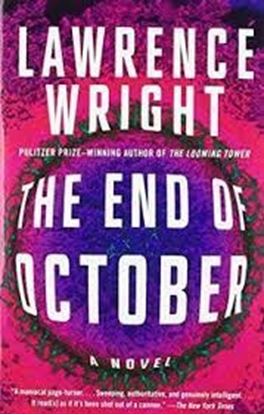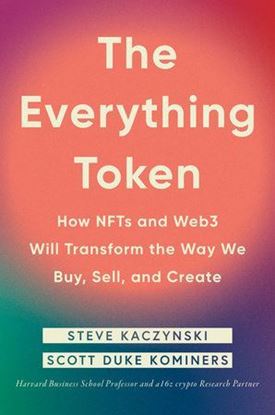

THE END OF OCTOBER (OF1)
At an internment camp in Indonesia, forty-seven people are pronounced dead with acute hemorrhagic fever. When epidemiologist Henry Parsons travels there on behalf of the World Health Organization to investigate, what he finds will have staggering repercussions. Halfway across the globe, the deputy director of U.S. Homeland Security scrambles to mount a response to the rapidly spreading pandemic leapfrogging around the world, which she believes may be the result of an act of biowarfare. And a rogue experimenter in man-made diseases is preparing his own terrifying solution.
As already-fraying global relations begin to snap, the virus slashes across the United States, dismantling institutions and decimating the population. With his own wife and children facing diminishing odds of survival, Henry travels from Indonesia to Saudi Arabia to his home base at the CDC in Atlanta, searching for a cure and for the origins of this seemingly unknowable disease. The End of October is a one-of-a-kind thriller steeped in real-life political and scientific implications, filled with the insight that has been the hallmark of Wright s acclaimed nonfiction and the full-tilt narrative suspense that only the best fiction can offer.
A swift and all-too-convincing chronicle of science, espionage, action and speculation that moves from Indonesia to Saudi Arabia to the U.S. as it eerily evokes real-life current events.
300
THE ENEMY
Enemies should never get a second chance. But this one might.
It’s been twelve years since June Broaden has seen her high school enemy (and secret crush), Ryan Henderson. That’s a long time to hold a grudge over some petty feud, but the sharp memory of him dangling a kiss at graduation, then pulling away at the last second, has fueled many angry fantasies since. Now it’s her chance to get even.
Ryan, along with most of her high school class, is back in town for her best friend’s wedding, and June is eager to show the former bully exactly what he’s missed out on. A lot has changed since their teenage days; June is now the Southern queen of gourmet donuts, not to mention one of the most desired bachelorettes in her small town.
What’s she’s not expecting, though, is for Ryan to show up looking like Adonis and touting his own career success as the youngest chef to ever win three Michelin stars. How dare he try to one-up her revenge plot? Luckily, June never backs down from a challenge.
950
THE EVER KING
For years, Erik, the scarred King of the Ever Kingdom, has thought of nothing but vengeance against the man who dilled his father and trapped him beneath the waves, making him a prisoner in his own realim
Until his enermy's dauahter unintentionally breaks the chains on the Ever, and Erik makes " werrtine annitting pawn in his vicious game of revenge. She's innocent. He's vicious. But he will take back what he lost, no matter the price. unless she steals his heart first
1,350
THE EVERYTHING TOKEN
NFTs aren’t just pictures on the internet, or a fad that has come and gone. Rather, they’re a new technology for creating digital assets and providing irrefutable proof of ownership. NFTs open up markets that have never before existed, and are already revolutionizing commerce and brand-building at everything from hot startups to Fortune 500 companies.
Kominers and Kaczynski have created a framework that explains what NFTs are, why they’re valuable, and how businesses can leverage them to build highly engaged and intensely loyal communities around their products and brands.
Through original research and industry experience, Kominers and Kaczynski describe the possibilities of this new digital frontier with clarity and rigor. The Everything Token is the essential primer on this innovation that has the potential to transform all aspects of business.
1,350
THE EXCHANGE (MM)
What became of Mitch and Abby McDeere after they exposed the crimes of Memphis law firm Bendini, Lambert & Locke and fled the country? The answer is in The Exchange, the riveting sequel to The Firm, the blockbuster thriller that launched the career of America’s favorite storyteller. It is now fifteen years later, and Mitch and Abby are living in Manhattan, where Mitch is a partner at the largest law firm in the world. When a mentor in Rome asks him for a favor that will take him far from home, Mitch finds himself at the center of a sinister plot that has worldwide implications—and once again endangers his colleagues, friends, and family. Mitch has become a master at staying one step ahead of his adversaries, but this time there’s nowhere to hide.
700
THE FAVORITES
She might not have a famous name, funding, or her family’s support, but Katarina Shaw has always known that she was destined to become an Olympic skater. When she meets Heath Rocha, a lonely kid stuck in the foster care system, their instant connection makes them a formidable duo on the ice. Clinging to skating—and each other—to escape their turbulent lives, Kat and Heath go from childhood sweethearts to champion ice dancers, captivating the world with their scorching chemistry, rebellious style, and roller-coaster relationship.
Until a shocking incident at the Olympic Games brings their partnership to a sudden end.
As the ten-year anniversary of their final skate approaches, an unauthorized documentary reignites the public obsession with Shaw and Rocha, claiming to uncover the “real story” through interviews with their closest friends and fiercest rivals. Kat wants nothing to do with the documentary, but she can’t stand the thought of someone else defining her legacy. So, after a decade of silence, she’s telling her story: from the childhood tragedies that created her all-consuming bond with Heath to the clash of desires that tore them apart. Sensational rumors have haunted their every step for years, but the truth may be even more shocking than the headlines.
1,300













